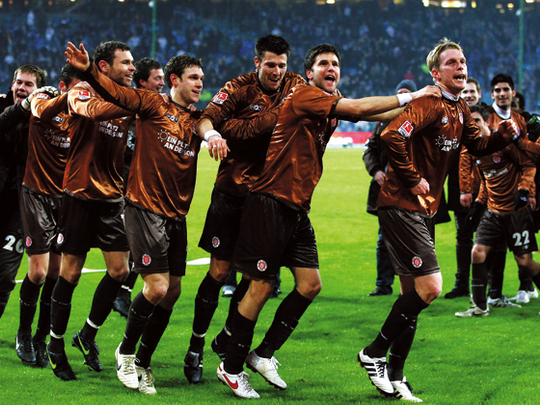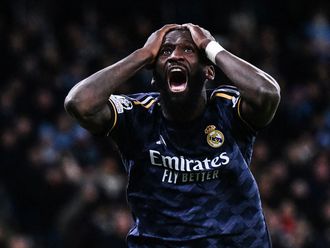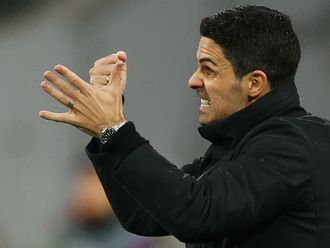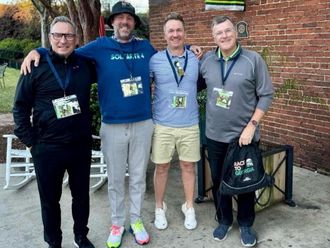
It's just before dawn in Germany. There's a party in full swing. And it's hurtling through the countryside at 128km/h, somewhere between Hamburg and the city of Mainz. The 900-strong army of revellers are fans of FC St Pauli, the world's most rock'n'roll football club - left-wing, left-field and left out on the edge of society with all the punks, tramps, rebels and other assorted misfits.
The venue is St Pauli's overnight ‘Crazy Train', a 15-carriage locomotive specially commissioned for the last away game of the season. There's drinking, dancing, disco lights and Deutschpunk. Flags are flapping through windows shoved open to suck out the cigarette smoke. There's precious little snoozing going on in the sleeper cars. And the ‘party carriage' - replete with DJs' decks and fully functioning bar - is rammed to the roof with a skull-and-crossbones-wearing rabble, bent on disturbing the small woodland creatures of the Rhineland and whoever else gets in the way.
Anyone would think they had something to celebrate, but St Pauli have already been relegated from the German top-flight after suffering an 8-1 mauling by Bayern Munich in their previous match. Yet even though their latest spell in the Bundesliga lasted but a single season - in their centenary year, no less - just being a fan of St Pauli seems justification enough to throw a party.
They hail from the working-class docklands district of Hamburg, a brawling sailor's left hook swing away from The Reeperbahn, one of Europe's biggest red-light districts. This is where bands like the Beatles and Black Sabbath learned their trade before hitting the big time, but these days it's home to an altogether different phenomenon.
In just three decades, FC St Pauli have been transformed from a nondescript provincial football team from Germany's second city into a symbol of non-conformity, radicalism and rebellion with worldwide notoriety. Among their growing army of fans are grindcore pioneers Napalm Death, Editors' guitarist Chris Urbanowicz, Andrew Eldritch from goth rockers the Sisters of Mercy, members of Icelandic band Sigur Rós and the Norwegian deathpunk outfit Turbonegro.
Add to that ragtag bunch some 200 supporters' clubs all over the world - from New Delhi to New York City - and the St Pauli anomaly shows even fewer signs of making sense. Stefan Schatz of the supporters' organisation Fanladen, and one of the organisers of the Crazy Train, tells of a fan club in Birmingham, England.
"There's a crazy bunch of Brummies who hate each other because of their city-rivalry, but when it comes to St Pauli, they all meet in Fred's Schlemmereck (a St Pauli pub in Hamburg), where you can find both Birmingham City and Aston Villa scarves hanging from the ceiling."
All welcomed into the fold
It all began in the mid-1980s, when squatters, punks and anarchists from the run-down neighbourhoods around St Pauli's Millerntor stadium began attending matches. They took a stand against the right-wing hooligans who attached themselves to many German teams, started singing anti-fascist and anti-racist songs. All were welcomed into the St Pauli fold. It didn't matter whether the team won or lost, if you wanted to watch football and raise hell at the same time, the Millerntor was the place to be.
The fans began bringing ‘totenkopf' flags emblazoned with the skull and crossbones to matches, partly as a joke, but also as an anti-establishment symbol to set them apart from Germany's elite. To this day the Jolly Roger has been embraced en masse, and it can be seen slapped on T-shirts and official club merchandise all over Hamburg.
The St Pauli roller coaster gathered pace, but it had more downs than ups. The team earned promotion to the Bundesliga, but its fortunes began to plummet both on and off the pitch. By 2003, St Pauli were languishing in the doldrums of the semi-professional northern regional league, and the club was in danger of going bust. The fans got to work organising fundraising events, but it was the commercial guidance of club president Corny Littmann - a successful businessman and Reeperbahn theatre owner - that steered the good ship St Pauli to safety and eventual promotion to the Bundesliga. Though his actions were not without controversy.
Littmann came under fire for a badly negotiated merchandising deal, and for embracing a culture of commercialism that strayed from the left-wing ethos of many fans. The once ramshackle stadium was renovated and two new stands were built, incorporating a slew of corporate areas and executive boxes. Some seats had beer pumps built into them and a model train set delivering sausages from the canteen.
Such home improvements coincided with one of the most dangerous things that can happen to any alternative movement: it became cool. This former bastion of outcasts and iconoclasts became a media darling. The St Pauli district of the city, once a squatters' paradise, underwent a period of gentrification. And as trendy new boutique shops and restaurants opened, rents began to skyrocket.
Pockets of the old hood might have been spruced up, but a visit to the Millerntor is still a pretty rum affair. The team still run out in their brown and white strips to the clang of ACDC's Hell's Bells. There's crowd surfing to Blur's Song 2 when a goal goes in. And the terrace repertoire tells it like it is - one ditty, to the tune of Bonnie Tyler's It's A Heartache, translates as:
"We are parasites,
Anti-social parasites,
We sleep under bridges,
Or in the tramp's hostel at the railway station run by the church."
Even so, with the club attracting an increasing number of middle-class out-of-towners to its fan base, groups such as the Sozialromatiker movement have decided to hit back. The old skull and crossbones flag has been given a new red background and renamed the Jolly Rouge, as the left-wing activists try to reclaim their club.
Jumping on the bandwagon
Oliver Bock, who writes for St Pauli fanzine Überstieger, offers some perspective. "St Pauli is drawing a lot of people you wouldn't normally find among a football club, and who might not be that interested in football at all. Critics of St Pauli would say it's just a fashion label with a football club attached to it and I know a lot of left-wing football fans who really dislike St Pauli for that reason. I think one has to differ between the core following and those just joining the bandwagon."
They may have leapt on the bandwagon, but it's difficult to spot any ‘Hooray Heinrichs' on the Crazy Train as it lurches to a halt in Mainz.
It's 9am, and the dishevelled droves piling onto the platform are nothing but hard-core St Pauli loons. They are met by the local constabulary's welcoming committee: several armoured police vans, one of which has ACDC blaring from its loud speaker. One supporter ties his brown and white scarf to the van's wing mirror, unimpeded. The German police know better than to antagonise a bleary-eyed bunch of St Pauli fans before breakfast.
By kick-off, the brown and white hordes are suitably refreshed and the party rages on. But the fans of today's opponents, FSW Mainz 05, are enjoying some festivities of their own. Not only are they celebrating Europa League qualification, but it's also the last match at their beloved old home before they move to a new ground. Stadion am Bruchweg has exploded into a confusion of colour. Flags and banners sway and drift overhead. Drinks are sloshed and confetti rains down. The chanting is loud and unrelenting. Trust the St Pauli party locomotive to crash head-on into an even bigger bash.
In contrast, the match itself is a dull and dismal affair. St Pauli play with all the technical proficiency of a pub team, never mind a punk team. They lose the match 2:1, and are condemned to finish the campaign at the bottom of the Bundesliga.
The fans seem oblivious to it all, as they raise their scarves in unison for a heartfelt chorus of You'll Never Walk Alone. Relegation, it seems, is but an occupational hazard when you are a supporter of St Pauli, as Fanladen's Schatz explains.
"I think that most supporters are OK with it. The team is OK. Of course there are a few players leaving and a few will be brought in, but it's not a total renovation. And financially it looks as if it was a good and comfy stay in the top flight - the club just announced a €3 million [Dh16 million] profit," he says.
Tired and emotional, but still in the party spirit, the St Pauli faithful march back to the station. They have a train to catch. An inter-city roller bound for Hamburg. Fridges restocked, ashtrays emptied, disco lights polished and sound system cranked up to 11. All aboard! The St Pauli Crazy Train is coming home.
Kogge - This self-styled rock'n'roll hotel specialises in bonkers accommodation for backpackers and bands on tour - in fact, anybody with an open mind. There's even an FC St Pauli room with brown and white duvets. www.kogge-hamburg.de
Movenpick Hamburg - Watching St Pauli can be a punishing affair for even the most hard-core party animal, but this hotel will have you feeling human again. Occupying a striking 19th century water tower, this four-star refuge has cosy rooms with fine views. www.moevenpick-hotels.com
Tickets to watch St Pauli can be bought from www.stpauli-fanladen.de










